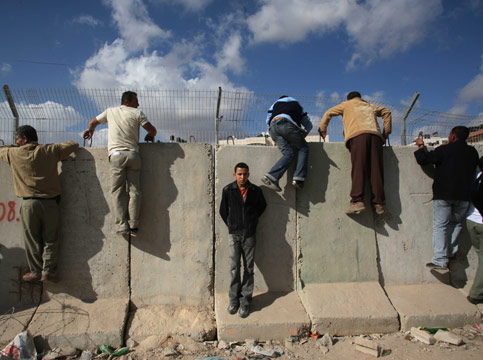BBC: UN envoy hits Israel ‘apartheid’
By Alan Johnston, BBC News, Gaza

A UN human rights envoy has compared Israel’s occupation of the Palestinian territories to elements of apartheid.
The UN’s Special Rapporteur, John Dugard, describes the regime as being designed to dominate and systematically oppress the occupied population.
Mr Dugard is a South African professor of international law assigned to monitor Israeli human rights abuses.
He has extensively studied apartheid in South Africa and has compared it to what he saw under Israeli rule.
Special rapporteurs are independent experts appointed by the UN secretary general to present reports on human rights to the organisation.
“Throughout the West Bank … settlers are given preferential treatment over Palestinians in terms of movement”
John Dugard, UN human rights envoy
Their findings do not represent UN policy.
In a new report, Mr Dugard says: “Israel’s laws and practices certainly resemble aspects of apartheid”.
He points to what he describes as “unashamed discrimination” against Palestinians in favour of Israeli settlers.
“It is difficult to resist the conclusion that many of Israel’s laws and practices violate the 1966 Convention on the Elimination of all forms of Racial Discrimination,” says the report.
“House demolitions in the West Bank and East Jerusalem are carried out in a manner that discriminates against Palestinians.
“Throughout the West Bank, and particularly in Hebron, settlers are given preferential treatment over Palestinians in terms of movement (major roads are reserved exclusively for settlers), building rights and army protection and laws governing family re-unification”.
The report ranges widely over the events of the past year and focuses on the Israeli military assault on Gaza during the summer.
This came after Palestinian militants captured an Israeli soldier, who they are still holding.
The army also described its campaign as an effort to stop the firing of crudely-made rockets from Gaza into nearby Israeli towns and villages.
Militant groups like Islamic Jihad often describe these attacks as retaliation for army raids and killings.
During the reporting period, two Israelis died and 30 others were injured in these random Palestinian attacks on civilian targets, and Mr Dugard says that they clearly constitute war crimes.
‘Controlled strangulation’
But his report also condemns the two Israeli offensives launched to counter the missile threat from Gaza.
Four hundred Palestinians died, and some 1,500 were injured – many of them civilians. Three Israeli soldiers were killed.
Mr Dugard says that this was a “grossly disproportionate and indiscriminate” response that led to the army committing “multiple war crimes”.
He also criticises the very tight controls that Israel maintains over the flow of goods and people in and out of Gaza.
These add to the poverty-stricken territory’s chronic economic problems – contributing to mounting levels of unemployment and desperation.
Mr Dugard says that Israel is imposing a policy of “controlled strangulation” that is helping to give rise to a failed state on its doorstep.
The Israelis argue that their border controls around Gaza are necessary for security reasons.
Militants have attacked crossing points in the past, and a suicide bomber recently emerged from Gaza and killed three civilians in the Israeli resort city of Eilat.
And more broadly, Israel has dismissed Mr Dugard’s report as being one-sided.
A foreign ministry spokesman, Mark Regev, said that it was a product of what he called “rank politicisation” of the UN’s human rights apparatus.
“This is the promoting of partisan, one-sided political attitudes which frankly don’t serve the interests of anyone who is seriously interested in human rights,” Mr Regev said.


